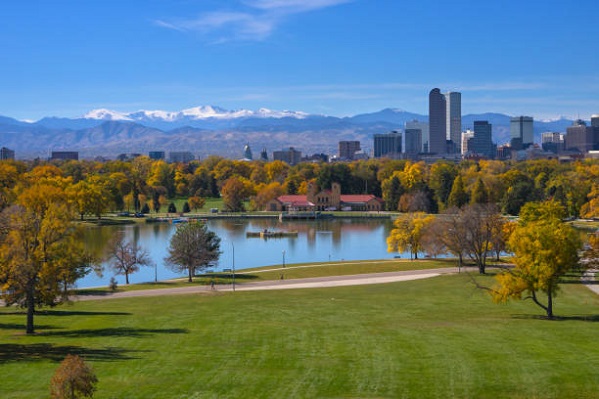DENVER, Colo. – Thursday afternoon, FIFA announced the cities that will host matches at the 2026 World Cup. Cincinnati, D.C., Denver, Nashville, and Orlando were the five U.S. based markets to miss out. Let’s go behind the scenes to see how and why the Mile High City will not be hosting games in four years.
Your #FIFAWorldCup 2026 Host Cities:
🇺🇸Atlanta
🇺🇸Boston
🇺🇸Dallas
🇲🇽Guadalajara
🇺🇸Houston
🇺🇸Kansas City
🇺🇸Los Angeles
🇲🇽Mexico City
🇺🇸Miami
🇲🇽Monterrey
🇺🇸New York / New Jersey
🇺🇸Philadelphia
🇺🇸San Francisco Bay Area
🇺🇸Seattle
🇨🇦Toronto
🇨🇦Vancouver— FIFA World Cup (@FIFAWorldCup) June 16, 2022
How and why the Denver World Cup bid failed
On the surface level, Denver had a number of clear advantages and disadvantages in competition with bids from the cities that won out. Infrastructure wise, it was one of the best. Denver International Airport is one of the largest and most accessible airports in the country. Once fans catch a ride share or the A Line to downtown, they’re a two mile radius from everything. One of the main negatives could have been the altitude. We’ve seen the World Cup be problematic when a certain host city has challenging playing conditions. Manaus was a travel nightmare in 2014 with six of the eight teams that played there lost their next match. Did FIFA want to avoid something like this happening? Did it really come down to Denver and Kansas City? Or is it more nuanced then that?
The bid itself:
Let’s start with the details of the Denver bid. There were a number of people and entities involved. Dr. Robert Contiguglia and Manny Rodriguez were co-chairs. The governor and mayor were honorary chairs along with Josh Kroenke. Wayne Brant and Pádraig Smith of Colorado Rapids were involved. The private nonprofit trade association VISIT DENVER was an organizational lead.
Years ago, prospective host cities signed a bid agreement with FIFA, then set up committees. The bid process then includes meetings, communication, and at least one visit from FIFA personnel to the city for a tour and pitch. Multiple sources familiar with the Denver bid and others indicated the in-person meeting did not go as well as they’d hoped. FIFA personnel were less impressed during their trip than they were at other cities. FIFA wanted to see host cities meet specific requirements and not leave certain things out. Sources conflicted on whether the proposal for a fan-fest at Ball Arena was good enough. It was not a deciding factor, but cities that were chosen may have wowed FIFA in ways Denver did not.
Matthew Payne, executive director of the Denver Sports Commission on the $: “We don’t have the public fundraising and the participation there that maybe other destinations have …. There wasn’t a requirement to have your funding put into place for any of these cities.”
— Andrew Villegas (@ReporterAndrew) June 17, 2022
Denver was one of the few bid that did not have government funding legislation passed by the city, county, or state under the condition of hosting World Cup games. This is unlikely to have played a role. All the infrastructure needed is in place. The DIA and Central 70 construction will be completed this year and acceptable as a result. Downtown is constantly getting renovation and new construction. Other cities might have needed this guarantee to make up for transportation, stadium, or public gathering areas that are currently insufficient. Denver did not.
There’s also a question of visibility. As someone who’s fully entrenched in the local soccer community, it wasn’t a main talking point amongst the general public. Advertising, news, media, merchandise were limited. The biggest sports media outlets covered this at most passively. The bid did not have big social media footprint. FIFA wants pageantry. “FIFA liked the visual aspects of things. They didn’t like the optics around D.C. and the stadium. Denver had no visual optics in terms of the soccer landscape, fan support for soccer,” said one source.
While it might not have been a deciding factor, Denver did not appear to have the same public and commercial enthusiasm as other host cities. Perhaps it came down to how the committee sold the bid rather than the tangibles. FIFA is not transparent. There has not been a formal debrief since the announcement. I doubt there will be.
I asked one of the committee members at the Dairy Block booth back in early 2020 if there was a way to get one of their “Denver 2026” scarves. Was told that I would have to donate a couple grand for one.
They could’ve mass-produced them and sold them at cost to hype up the bid.
— Joseph Samelson (@jspsam) June 16, 2022
Denver vs. Kansas City:
This is the most common thing I’ve seen on Twitter. Sources familiar with both the Denver and Kansas City bid dismissed the notion that Denver lost out specifically to Kansas City. FIFA does not appear to be good at geography. They had Atlanta, GA in the “Central Region” for Pete’s sake. New York, Philadelphia, and Boston all got accepted. Geographic density was not a significant factor in the decisions.
One KC source said that FIFA came away thinking KC wanted it more than any other city. There was excitement with every interaction. Their in-person visit and presentation was the most complete and well thought out. It left no doubt that Kansas City would do a great job hosting games. The KC committee knew what they were up against. The airport and stadium locations relative to downtown are not ideal. They had answers for these and all other concerns FIFA had. KC is not a top 30 media market in the country. Every other U.S. city that made it is top 20. For reference, Denver is #16, having lost out to #18 Miami.
The Kansas City bid committee played to win, knowing they had to come from behind. Perhaps Denver played not to lose. But in no way was it Denver vs. KC, one or the other.
Denver vs. two Texas hosts:
The other geographic competition to look at is both Texas bids winning out over Denver. Both venues are newer than Mile High, though NRG Stadium in Houston has a smaller capacity. One concern with Texas is the summer heat. Both NRG and AT&T Stadium have closeable roofs. The roofs will likely be closed for all games. If only Mile High had a pressurized dome that could mimic sea level atmosphere.
Proximity to Mexico was a big deal as well. Mexico and Canada likely will play their group stages entirely in their home country. FIFA could set up the schedule so the winner of Mexico’s group plays in Mexico as long as possible. If the Azteca does not get a knockout stage game, they could make it so Mexico plays in Texas as long as they advance (the group winner at one location, runner up at the other). Dallas and Houston have lots of Mexican immigrants and cultural influence. That would be easy travel for fans coming from Mexico as well.
Fans from the USA and Mexico were #1 and #5 in number of visitors to Russia during the 2018 World Cup. The U.S. was first largely because of Mexican Americans going to support El Tri. Dallas and Houston rank #5 and #8 largest media markets in the country. This was another disadvantage for Denver. FIFA wants to get the most out of the El Tri money machine. Denver hosted the Concacaf Nations League last year. The final was USA-Mexico on a Sunday. Even with reduced capacity due to COVID, neither matchday sold out.
Dallas was always going to get in. Houston makes it guaranteed FIFA can maximize revenue off of El Tri’s success.
Other bubble bids, representation, and playing politics:
Several reports have come out that Boston was the last city accepted, beating out the joint D.C. Baltimore bid. Rather than focusing on KC, perhaps soccer fans in Colorado should be wondering how they were secondary to bids where the stadium is over 35 miles from the city center. The joint bid with D.C. hosting all the fan activities but games taking place at M&T Bank Stadium in Baltimore was doomed from the start.
Boston getting in might have come down to political pull. New England Patriots and Revolution owner Robert Kraft was on the 2026 United Bid Committee that got the three host nations this tournament. He was also involved in the U.S.’s bid to host in 2018 and 2022.
Most bid committees had representation from the local NFL team who’s stadium would be used. Most bids had someone with connections to U.S. Soccer. As cities were announced, FS1 played videos of a celebrity from those cities. Jokes were made that Denver lost because they didn’t have a celebrity to do a congratulations video.
I understand that the Denver Broncos didn’t have much involvement with the change in ownership. But they couldn’t get John Elway or Payton Manning to be the public face? Tim Howard did some promotions for the bid when he was still a Rapids player. That seemed to end when his contract expired. This might all have been sizzle with little substance added, but as previously stated FIFA cared about that.
The strongest soccer presence on the committee were Rapids leadership. The Denver bid committee could have benefited with representation and effort from the Broncos, someone with connections to U.S. Soccer, and a prominent former national team player or two.
FIFA execs said they didn’t make final decisions on World Cup host cities until late Weds./early Thurs.
Omitting D.C. was their most surprising choice. According to a source familiar with their process, that bid likely lost out to Boston.
W/ @MLSist: https://t.co/EWqg36nGON
— Sam Stejskal (@samstejskal) June 17, 2022
Altitude Double Standard:
Another complaint I’ve seen has been the double standard around altitude. Guadalajara is just under a mile above sea level. Mexico city and Monterrey are both over 7,000 ft. If Denver’s altitude was a concern, why did all three of Mexico’s cities make it?
FIFA engages in hypocrisy and double standards all the time. Every game played in Mexico is going to make bank. As soon as those three bids met the minimum requirement for FIFA, they were locks. Denver’s altitude was only relevant in competition with the other U.S. cities. That being said, Denver sources felt it played a role but was not massive. Their efforts of the bid did not overcome this weakness in ways Boston and KC were able to overcome their cons.
Broncos ownership and stadium uncertainty:
The Broncos just got sold. This was years in the making. Several reports suggest FIFA made their final decisions this week. One of the rumblings about the ownership change is whether the Walton-Penner family will build a new stadium complex like SoFi or Jerry World, possibly out near the airport. No one speaking to Last Word thought this was a factor. If anything, this would have enhanced the bid. The stadium would have been new, state of the art, and built with with the World Cup in mind.
Last Word: It was All the Small Things
The Denver bid committee hosted a private watch party on Thursday for the announcement. A source in attendance described it as nervous excitement and cautiously optimistic. Clearly a number of markets knew they were going to get it. Everyone else probably felt 50/50.
If you’re going to point fingers, start with committee of course. Geography, altitude, and competition with other cities were factors. But none of them were damning. These could have been overcome had they handled their bid similar to KC. It was a combination of circumstance and execution. There was no one thing that did it. Denver won’t be hosting World Cup games because of all the small things.






